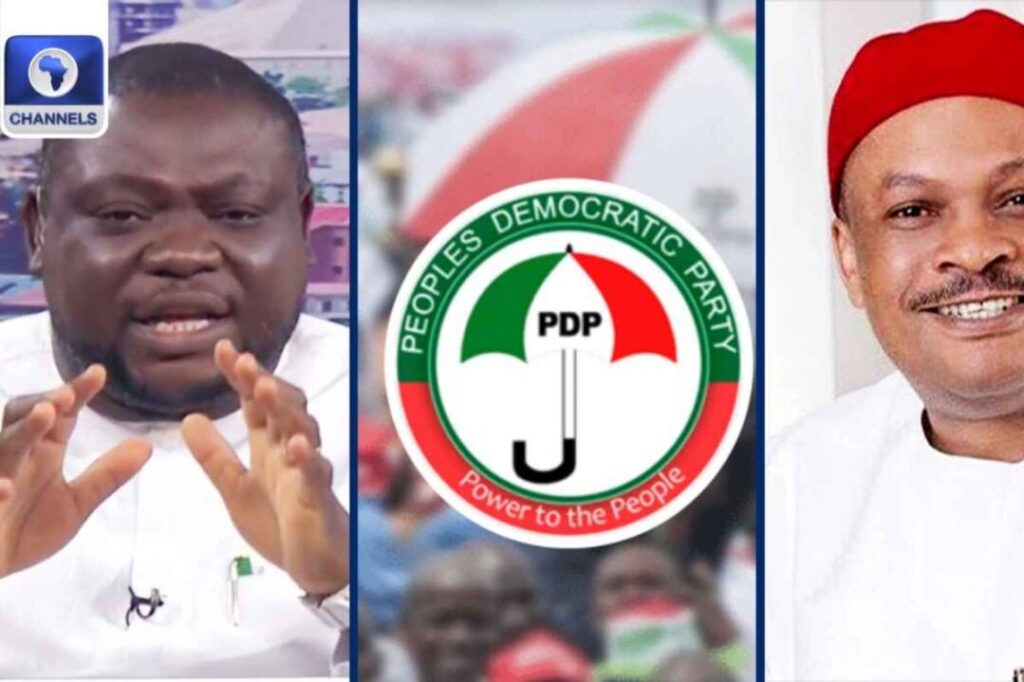The disagreement over who legally occupies the office of the national secretary of the PDP has lingered for months, further deepening the crisis in the opposition party.
The Caretaker Chairman of the Peoples Democratic Party (PDP) in Bayelsa State, George Tunah, has said that the National Executive Committee is not constitutionally empowered to elect or remove national officers of the party.
Tunah stated this during an interview on Channels Television’s The Morning Brief on Thursday while reacting to the rejection of the reinstatement of Senator Samuel Anyanwu as the National Secretary of the PDP by 11 members of the National Working Committee on Wednesday.
This came after a press briefing by the PDP Acting Chairman, Umar Damagum, earlier on Wednesday, where he announced the cancellation of the NEC meeting and reinstated Anyanwu as the national secretary.
Tunah noted that there was never a 99th NEC meeting, adding that the constitution of the party was clear as to how a NEC could be convened and who should issue a notice of a NEC meeting.
“By our constitution, a national officer of the party is elected at the national convention for a secure term of for years. Now, this term of office can only be cut short either by removal, resignation, or other processes enabled by the constitution.
“The only organ of our party that has the powers by our constitution to elect or remove national officers is the convention, not even the NEC,” he said.
“Now, unlike the situation when the constitution allows the NWC to make decisions on behalf of the NEC in the case of emergency, it is not the same with the national convention.
“No section of our constitution gives any power to even the NEC to make any decision on behalf of the convention. Whatever is restricted to the convention must be done by the convention,” he added.
‘No Proof Anyanwu Resigned’
Speaking further, the Bayelsa caretaker chairman also said that there was no proof that Anyanwu resigned when he emerged as the party’s candidate and contested the governorship election in Imo State.
He explained, “They said Anyanwu resigned; up till this moment, there is no resignation letter. Our constitution does not compel an officer who seeks elected office or public office to resign.
“Anyanwu offered himself to screening committees before he became the flag bearer of our party. Where is the resignation letter from Anyanwu? According to Sections 85 and 86 of the Electoral Act, for every meeting of the party that is to elect officers of the party or remove, or elect candidates of the party for elections, or approve mergers, you must give a 21-day notice to INEC.
“What it means is that if an officer of the party resigns, by Section 86 of the Electoral Act, which grants INEC the power to regulate all the activities of political parties, you must file that report to INEC to say, ‘The officer you came to monitor the convention wherein he was elected has reigned. Look at the resignation letter. There was no such thing.”
The 11 members of the NWC had in a statement on Wednesday insisted that Anyanwu had not been reinstated as the party’s national secretary, saying that only the NEC had the power to make such decisions.
The statement read in part, “For the avoidance of doubt, the NEC is the highest decision-making organ of the party, second only to the National Convention. By virtue of Section 31 (3) of the PDP constitution, the resolution of the NEC to hold its 100th meeting on Monday, June 30, 2025, is binding on all organs, officers, chapters, and members of the party and no organ, group or individual can vary or veto this resolution of NEC.
“Furthermore, the claim by Damagum that Senator Samuel Anyanwu has been asked to resume office as the National Secretary of the party is therefore misleading, being contrary to the resolution of NEC.
“In the light of the foregoing, the 100th NEC meeting as scheduled for Monday, June 30, 2025, has not been canceled or postponed.”
The disagreement over who legally occupies the office of the national secretary of the PDP has lingered for months, further deepening the crisis in the opposition party.
By Alexander Okere
Channel TV



